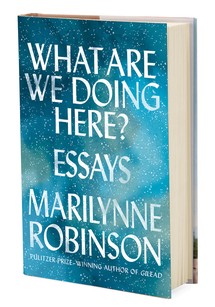The titular question of Marilynne Robinson's luminous and
brainily raucous
What Are We Doing Here (FSG) is directed,
in an essay of the same name, at those who work to keep critical thinking
alive: "What are we doing here," she asks, "we professors of
English?" In these 15 trenchant pieces on humanism, nationalism versus
patriotism, "the divine," she ponders the unanswerable on multiple
levels: What does this strange political moment augur? What is our role
(morally, spiritually, intellectually) in the universe?
For example, Robinson argues that at public universities,
true learning—which imparts an appreciation for the arts and humanities as "the
most pregnant evidence we can have of what is possible in us"—is being
sacrificed on the altar of perceived employability, most particularly for the
working classes. To Robinson, this matters not just in principle, but because a
liberal arts education shouldn't be an elitist enterprise; it is essential to "the
survival of our [American] experiment." She writes, "This country is
in a state of bewilderment that cries out for good history."
Robinson
is known as the author of ethereal and psychologically tough novels such as Housekeeping,
Lila, and Gilead, winner of the
2005 Pulitzer Prize, but she has easily donned the mantle of public
intellectual. Most of these pieces predate the 2016 election, which makes her
work seem thrillingly prescient. Robinson's unapologetic opinions will
doubtlessly ruffle a few feathers (she argues for the Puritans and against
Churchill; her piece in praise of Obama, calling him "a philosopher,
perhaps a theologian," is among her strongest and most memorable), but
what's indisputable is that, with this volume, Robinson claims her place as an
essential thinker—a modern, homebred Tocqueville—and offers a wake-up call for
the soul, and for the nation.

